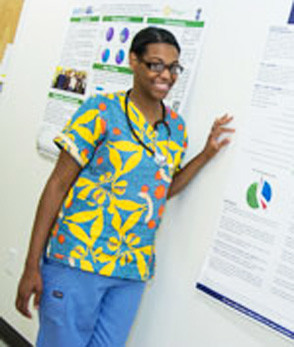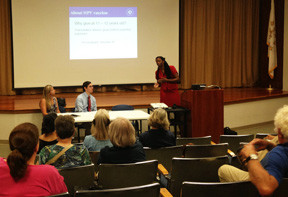A tale of hope, prevention and fear
School mandate for the HPV vaccine faces a number of apparent obstacles, including inaccurate news reporting
BARRINGTON – The plan was to do a story about the efforts of Clinica Esperanza to provide free HPV vaccines to uninsured young men and women, ages 19 to 26, beginning on Aug. 14, emphasizing the fact that the medical volunteers working in the clinic would be wearing colorful handmade scrubs, mimicking storytelling cloth with graphics that had been designed as part of a campaign against HPV in the African country of Mali.
Dr. Annie De Groot, the clinic founder and director, has been working closely with health officials in the West African country to screen and to protect women for cervical cancers.
In partnership with Eliza Squibb, a graduate of the Rhode Island School of Design, the two had designed an African storytelling cloth with images of the virus that men and women in Mali were wearing to show the connection between HPV and the prevention of cervical cancer.
The project, funded through a grant from the Bill and Melinda Gates Foundation, has proven to be a big success; the storytelling cloth is scheduled to make its Rhode Island debut this week.
Context and content
To provide some context to the planned story, ConvergenceRI thought it would be important to attend one of several listening sessions about the new state program mandating 7th graders, both girls and boys, to get the HPV vaccine before school begins this year. The new mandated vaccine had generated some controversy and push back for those who fear the move as government interference in their lives.
The first was held on Wednesday, Aug. 5, on the second floor of the Barrington Public Library.
The listening session did prove very helpful in framing the originally planned story.
But plans changed the next day, when ConvergenceRI read the account of the listening session in The Providence Journal, a story filled with inaccuracies.
A skewed story
The Providence Journal published a front-page story in its Aug. 6 edition which claimed “more than 60 parents turned out” for the listening session in Barrington.
That number was flat-out wrong; the actual count of people attending was about 35 – ConvergenceRI counted the crowd three times, just to be accurate.
Many of those attending were not there as concerned “parents” worried about the new mandated vaccine program, as the article implied; they were actually there to voice support for the HPV vaccine program.
Among the 35 people attending were: a school nurse from Barrington public schools, six doctors, including two pediatricians and three ob-gyns, a member of a wellness team that administers vaccines, five news reporters and photographers, including ConvergenceRI, and a representative of the health department sitting in the audience. They may or not have been parents; they were not necessarily attending the listening session as parents.
Translated, that means there were some 14 people there for professional reasons, and about 21 were there as parents and families, concerned about the state’s role in mandating the vaccine.
It was not an overwhelming turnout, given the high-volume social media campaign promoted on Facebook by political groups such as the R.I. Center for Freedom and Prosperity, led by Mike Stenhouse.
Hyping the confrontation, not the dialogue
The story in The Providence Journal also inaccurately portrayed the tone of the dialogue that occurred as one of hostile confrontation, with doctors squaring off against each other.
In fact, the tone of the conversation was civil, and while there were strong disagreements, and strong emotions voiced by opponents and proponents in the audience, at the end, when the session concluded, even most vociferous opponents of the vaccine mandate joined in warm applause for Dr. Nicole Alexander-Scott and her team from the R.I. Department of Health, including Tricia Washburn, chief of the Office of Immunization.
Yes, there were disagreements aired during the listening session, but the context – and the positive conclusion – was entirely missing from the story.
The story’s lede sentence began: “Doctors faced off against other doctors…” It may have been a great way to promote conflict and tension in a front-page story to sell newspapers, but, once again, it was not accurate. [Given that the newspaper's copy editing hub is now located in Austin, Texas, it's possible that the problems originated there, and not with the reporter.]
Only one doctor, Dr. Chris Stowe, an anesthesiologist, who practices in Fall River and lives in Massachusetts, who himself has no children in Rhode Island’s schools, and who described himself as being against mandatory flu shots, spoke out against the use of a school mandate for the HPV vaccine. [Such details were not included in the Providence Journal story.]
Stowe cited statistics purporting that there had been reports that the vaccine had resulted in 14,000 adverse effects, including 37 deaths, which was dutifully reported as fact in The Providence Journal story.
What the article didn’t say was this: the statistics cited by Stowe were taken from raw data from a passive reporting system used by the Centers for Disease Control and Prevention, which logged in any and all suspected claims of adverse effects, and then investigated them.
Washburn and Alexander-Scott both responded to Stowe, attempting to correct his “misunderstanding” of the statistics. In fact, some 67 million doses have been safely administered in the U.S., and there have been no reported deaths as a result of the HPV vaccine – none, zero – according to the CDC.
Some 91 percent of the 14,000 reported adverse effects captured by the passive reporting system, upon investigation by the CDC, were found to be non-serious – typical redness, soreness, slight fever or headache.
Further, Alexander-Scott said that no severe adverse effects had ever been reported and confirmed in Rhode Island as a result of administering the HPV vaccine, according to the CDC.
By reporting the dialogue as if it was a “he says this, she says that” kind of story, by letting Stowe’s claims stand, without any explanation or clarification, the coverage, once again, skewed the story. [It also created a digital placeholder in our Google-search world where Stowe’s mischaracterization of CDC statistics will remain an uncontested factoid.]
More relevant dust-up was omitted
Surprisingly, a much more relevant dust-up between Stowe and another doctor attending the session was not included in the story.
Stowe had argued that PAP smears offered a more effective clinical intervention in detecting and preventing cervical cancer, compared to the HPV vaccine, even though it was an area of medicine far from his own expertise.
Dr. Anne S. Devi Wold, a reproductive endocrinologist and medical geneticist, who has held faculty positions at both Yale University and Brown University medical schools, stood up and spoke, countering Stowe claims.
Devi Wold went into great detail about the importance of the HPV vaccine as a preventive measure, protecting both women [and men] from the virus and all its manifestations – and not just from cancer.
She countered Stowe’s arguments about PAP smears, explaining that PAP smears don’t prevent cancer, and that the HPV vaccine, by preventing both cervical cancer and other kinds of virus-caused problems, also prevents women from having to undergo unnecessary, painful procedures.
Stowe offered no response or counterpoint to Devi Wold; yet the entire exchange was missing from the Providence Journal’s account.
Confirmation
To double-check the accuracy of what Devi Wold had said, ConvergenceRI spoke the next morning with Dr. Katina Robison, a gynecologic oncologist at Women & Infants Hospital.
“I am considered the local expert on HPV-related diseases,” Robison told ConvergenceRI, citing her extensive research on HPV infections.
“PAP smears don’t prevent cancer,” Robison said. “They are able to detect some pre-cancer conditions. The HPV vaccine can prevent pre-HPV diseases. The HPV vaccine can prevent women from undergoing unnecessary procedures, including removing part of the cervix,” she said, confirming exactly what Devi Wold had said.
ConvergenceRI asked Robinson if she could talk about the apparent fears surrounding the use of HPV vaccine.
“This is a very, very well tested vaccine,” Robison said, saying the HPV vaccine was very safe.
“It’s interesting,” she continued. “A lot of my friends have asked me about vaccinating their children.” Robison said she tells them that the vaccine is about preventing cancer, preventing women and men from getting cancer down the road.
Another frequent question, Robison said, is: why vaccinate children now, when they aren’t sexual active? She explained, just as Alexander-Scott had done the night before, that giving the HPV vaccine when someone is 11 makes it more effective in terms of the immune system.
In turn, Robison said research debunked the myth that the vaccine promoted sexual activity among teens. “Research has shown that administering the HPV vaccine doesn’t change sexual activity,” she said.
Exemptions
At the heart of Stowe’s argument was his belief, as someone philosophically opposed to vaccinations, that the schools were being used what he described “as a weapon to intimidate parents.”
In a calm voice, repeatedly, six or seven times, Alexander-Scott attempted to reassure Stowe and others that the goal was to keep students in school, that there was both a medical and religious exemption offered to parents who objected to the HPV vaccine. Parents who objected to the HPV vaccine can request this exemption, she said.
Lawyers at the health department had determined that the religious exemption was broad enough to include philosophical objections by parents, she explained. And, to one man, who asked pointedly, “What if I’m not religious? What if I’m an atheist?” Alexander-Scott answered, yes, that would be OK.
Further, in response to another question, whether the religious exemption had to be repeated each year, the school nurse from Barrington said that no, that wasn’t true. The exemption would be kept on file and remain confidential.
The metaphor that Alexander-Scott used for the HPV vaccine was one of prevention and protection. “The HPV vaccine is like putting on and wearing a bicycle helmet before you get on the bike,” she said.
Hope comes in many bright colors
The first of three shots of the HPV vaccine will be offered for free to uninsured men and women, ages 19 to 26, from 2 to 7 p.m., on Aug. 14 at Clinica Esperanza, the free clinic at 60 Valley St. in Providence.
Valerie Joseph, full-time nurse director of Clinica Esperanza, came up with the idea to launch the HPV prevention campaign at the clinic – and use the African cloth as a special touch, according to a news release from the University of Rhode Island.
Joseph and other nurse volunteers giving the vaccine will wear scrubs made from the fabric.
The scrubs were a family affair: Valerie’s mother, Marguie Joseph, a respiratory therapist, sewed five shirts with the cloth, a bold blue and yellow print of uteruses surrounded by a near-invasion of HPV viruses in abnormal cancer cells.
The top has two front pockets and sleeves with slogans in French – “Je me protégé” or “I am protected” – to spread the word about the importance of getting vaccinated.
In Africa, cloths are like social media, conveying political and cultural messages.
Joseph said she decided to create the HPV program after realizing that many of her patients, both men and women, had not been vaccinated. She attributed that to lack of knowledge about how HPV can cause cancer and the stigma attached to the shot.
“Some parents thought the vaccine was a green light allowing their kids to be sexually active, but nothing is further from the truth,’’ she said. “We’re trying to save lives.”







